|
|
|
Sort Order |
|
|
|
Items / Page
|
|
|
|
|
|
|
| Srl | Item |
| 1 |
ID:
114682
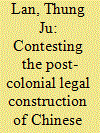

|
|
|
|
|
| Publication |
2012.
|
| Summary/Abstract |
The legal construction of the Chinese Indonesians in post-Independence Indonesia, particularly during Suharto's New Order, is reflected in the so-called SBKRI - Surat Bukti Kewarganegaraan Republik Indonesia (the Republic of Indonesia Citizenship Certificate). The certificate reproduces the colonial racism that divided the population of the Dutch East Indies into three racial categories, namely the Europeans on the top of the ladder, the Foreign Orientals (Chinese, Indian, and Arab) in the middle, and the Inlanders (or natives) at the lower end. In this paper, I problematize the basic principle of the Indonesian Constitution that 'all (Indonesian) citizens have equal rights in the eyes of the law' for the case of Chinese Indonesians. Even though the chapter on citizenship in the 1945 Constitution has been amended twice, I believe the amendment did not correct the racism embedded within.
|
|
|
|
|
|
|
|
|
|
|
|
|
|
|
|
| 2 |
ID:
114685
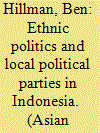

|
|
|
|
|
| Publication |
2012.
|
| Summary/Abstract |
Since Indonesia's return to multiparty democracy in 1999, national law makers have introduced regulations that effectively ban ethnic or regionally based political parties. A major exception to the rule can be found in the province of Aceh where ethnic separatists were granted the right to form their own political party to contest local elections in return for giving up their armed struggle for independence. In legislative elections held in 2009 the party of the former rebels - the Aceh Party - won a landslide victory. Drawing on in-depth interviews with national party leaders and parliamentarians, this article examines the implications of the rise of the Aceh Party for Indonesia's political party system and the potential for ethnic-based parties to resolve ethnic conflict and secessionism in other parts of Indonesia, including in Papua where the failure of special autonomy arrangements has led to increased militancy among indigenous Papuans.
|
|
|
|
|
|
|
|
|
|
|
|
|
|
|
|
| 3 |
ID:
114680


|
|
|
|
|
| Publication |
2012.
|
| Summary/Abstract |
The article explores the comparatively peaceful reconstitution of the relationships between law, religion and identification processes among the Minangkabau in West Sumatra, Indonesia, since the fall of the Suharto regime in 1998. The local reorganization of village government and land claims included the revitalization of adat institutions which in turn provoked a reconsideration of the role of Islam, as indeed of the meaning of 'being Minangkabau', indicating tensions within the relationships between matrilineal Minangkabau adat, Islam, and the state. The paper seeks to explain this reconsideration and contestation of Minangkabau identity, and how the various actors mobilize identification with a particular legal order within the plural legal constellation enhanced by the recent decentralization process in Indonesia. Disputes seem to be an important avenue for understanding identification processes, and conversely, disputing cannot be understood without a comprehension of identity formation.
|
|
|
|
|
|
|
|
|
|
|
|
|
|
|
|
| 4 |
ID:
114683
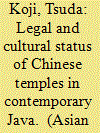

|
|
|
|
|
| Publication |
2012.
|
| Summary/Abstract |
Since the collapse of Soeharto's New Order in 1998, Indonesia has been experiencing broad political and social changes. While the Soeharto regime was generally cautionary and oppressive toward anything related to China or the ethnic Chinese, the subsequent administrations faced the pressure to make sweeping changes to existing discriminatory policies and laws, and have put these changes into action, though gradually. With this major change in the social environment, an atmosphere is being engendered across the nation, producing a feeling that anyone is free to enjoy 'Chinese culture' which for a long time was banned from being expressed in public. This spirit is palpable for example during Chinese New Year, when red lanterns and other ornate decorations, and characters such as Gong Xi Fa Cai () are seen dancing about everywhere. Along with upscale malls and hotels, it is Chinese temples (klenteng) that have become the centers of these festivities. Having been the anchorage of traditional worship for the ethnic Chinese, during the Soeharto era these facilities were the target of unfavorable treatment. In the last few years, their activities have gradually been revitalized. This article scrutinizes the changed legal and cultural status of the Chinese temples engendering changes within the Chinese community at large, by focusing on developments in post-'New Order' Java.
|
|
|
|
|
|
|
|
|
|
|
|
|
|
|
|
| 5 |
ID:
114686
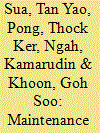

|
|
|
|
|
| Publication |
2012.
|
| Summary/Abstract |
This paper surveys the roles of seven Chinese associations in Kuala Terengganu in maintaining and propagating Chinese culture within a Malay state. These associations have played significant roles in maintaining and propagating Chinese culture as far as the range of cultural activities hosted by them is concerned. There is also a reasonable level of state cultural leadership, though lacking in certain areas. But the small population and the outflow of the younger generation have presented a host of problems to the Chinese associations with regard to the required critical mass, pool of talent, injection of ideas and second-tier leadership. The lack of financial support is yet another problem arising from the peripheral role of the Chinese in the state economy and their small numbers. Meanwhile, leaders of the Chinese associations exercise restraint so as not to infringe on Malay religious sensitivity when hosting outdoor cultural activities during the Muslim ritual periods. They also exhibit a high degree of tolerance towards Islamisation programmes undertaken by the state as long as these programmes do not encroach into their private socio-cultural domains. Despite their small population, the Chinese in Kuala Terengganu are a politically significant minority as a result of the political outbidding among the Malays. Leaders of the Chinese associations have benefited from such a position in resolving certain long-standing cultural issues.
|
|
|
|
|
|
|
|
|
|
|
|
|
|
|
|
| 6 |
ID:
114684


|
|
|
|
|
| Publication |
2012.
|
| Summary/Abstract |
In our digital age when most movies viewed at home carry Interpol warnings that copyright piracy is a crime, yet patented medicines are unaffordable for millions, ethical debates about intellectual property rights and freedom of information are becoming widespread. But a less noticed topic in these debates is the recent international effort to expand and implement Euro-American models of intellectual property law among peoples whose daily activities previously have not been covered by formal intellectual property laws (primarily copyright, patent, and trademark regulations). This essay considers how this trend is unfolding in post-Suharto Indonesia, particularly the tension between national efforts to create legal property rights over cultural resources and the fact that most ordinary Indonesians do not view their cultural knowledge and aesthetic or ritual activities as property to be claimed in an exclusive way by their ethnic group or government. Plans to legalize the cultural ownership of regional arts are addressed with ethnographic examples from Indonesian fieldwork including 2005-07 visits conducted by an international team of lawyers, musicologists, anthropologists, and Indonesian community activists with 'traditional' arts producers from eleven cultural regions in eight provinces.
|
|
|
|
|
|
|
|
|
|
|
|
|
|
|
|
| 7 |
ID:
114679
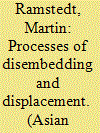

|
|
|
|
|
| Publication |
2012.
|
| Summary/Abstract |
This article applies Karl Polanyi's observation of a double movement of law in the history of nineteenth and early twentieth-century Europe to an analysis of Bali's integration into the global cultural economy. It describes how the increasing disembedding of the island's tourist industry from local norms and institutions, and the parallel disjuncture between Balinese religiosity and Indonesian state religion have created a condition of increasing collective anomie that has in turn provoked endeavors to juridify the Balinese religio-ethnic identity. Conceding the partial success of the juridification process that has been facilitated by the recent governance reform, and that has indeed effected a significant degree of re-embedding both tourism and religion into local culture, the article argues that not only has the anomic condition not been attenuated; the potential for internal conflict and division has even been enhanced.
|
|
|
|
|
|
|
|
|
|
|
|
|
|
|
|
| 8 |
ID:
114681


|
|
|
|
|
| Publication |
2012.
|
| Summary/Abstract |
Proliferating conflicts in the Moluccas, Kalimantan, and Central Sulawesi marked an increasing interest in ethnic politics in post-1998 Indonesia. At the same time, the establishment of the National Adat Alliance (AMAN) in 2003 ushered in a new era of ethnic awareness among the customary law (adat) communities in Indonesia. In order to resolve the religious and ethnic conflicts as well as communal tensions, the central government enacted a Joint Decree that stipulated the creation of the Forum for Religious Harmony (FKUB). In North Sulawesi, however, neither the Protestant Church (GMIM) nor the Minahasan adat community has strongly supported the FKUB. On the one hand, the GMIM wanted to have a conflict resolution and conflict prevention strategy that appeared less 'religious' and in so doing the GMIM decided to work closely with a social network called JAJAK. On the other hand, the adat community perceived the proliferating conflicts as detrimental to their struggle for an ethnic recognition. Forging an alliance with the GMIM was impossible due to the history of violent relationship between the church and the adat leaders. The adat activists eventually created the Minahasan Adat Council (MAM). This essay argues that ethnic politics in post-1998 North Sulawesi have been confronted with strong resistance from religious authorities; however, at the same time, religion was able to capitalize on an emerging interest in ethnic movements on the national level.
|
|
|
|
|
|
|
|
|
|
|
|
|
|
|
|
|
|
|
|
|